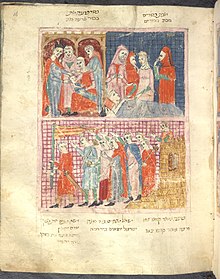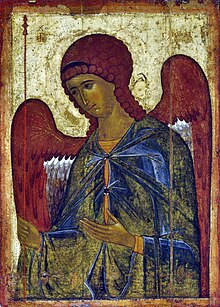Child mortality
Appearance
(Redirected from Death of children)
Child mortality, refers to the mortality of children. It also encompasses neonatal mortality and infant mortality (the probability of death in the first year of life).
Quotes
[edit]- I find no evidence that the Greco-Roman pagan tradition ever regarded the sufferings of small children as so problematic that moral-philosophical treatises were devoted to this question. On the contrary, writers such as Cicero and Seneca criticize parents and especially fathers for grieving over the deaths of their small children. As I noted in the previous chapter, our sources do not give an unambiguous answer to the question whether parents did, in fact, grieve over their dead babies, but the fact that representatives of the intellectual elite express the view that small children are nor worth their parent’s grief tells us clearly what kinds of reaction were regarded as conventional.
This means that the church fathers apparently had a different attitude to the worth of babies than that found in the pagan moral-philosophical tradition. Although our sources are not explicit on this point, it is reasonable to believe that this positive assessment of the worth of babies is connected with the idea that all human beings, even small children, are created in the image of God. Whereas pagans thought that a newborn baby was not a human person in the full sense, patristic thinking implies that the newborn possesses the fullness of human dignity. I quote Cyprian’s words once more: “For what is lacking to him who has once been formed in the womb by the hands of God?” (Ep. 64:.2). This means that the newborn has a soul and can receive the gifts of divine salvation, and that the church is the instrument that it to mediate these gifts even to the smallest children. The idea that babies are created in God’s image, and hence are the recipients of divine salvation, thus leads to a focus on babies and an interest in them that unknown in pagan antiquity.- Odd Magne Bakke, “When Children Became People: the birth of childhood in early Christianity”, translated from Norwegian by Brian McNeil, Augsburg Fortress Minneapolis, MN, (2005), pp. 108-109
- However, somewhat contraditory [sic] I would think, it the fact that Catholic priests do not, ordinarily, give a fetus the usual extreme unction or burial services afforded a still-birth. It seems to me that this kind of differentiation, in practice, is in variation with their beliefs. If they do consider the fetus to be alive, why do they deny it the extreme unction given the child born dead? I have never heard this question answered.
- Ruth Barnett. They Weep On My Doorstep. Beaverton, Oregon: Halo Press. 1954, page 107.

- That they may not become too complacent or delighted in married life, he makes them distressed by the shortcomings of their partners, or humbles them through willful offspring, or afflicts them with the want or loss of children. But, if in all these matters he is more merciful to them, he shows them by diseases and dangers how unstable and passing all mortal blessings are, that they may not be puffed up with vain glory.
- John Calvin Golden Booklet of the True Christian Life (published 1551), pg. 69

Then Job arose, tore his robe, and shaved his head; and he fell to the ground and worshiped. And he said:
"Naked I came from my mother’s womb,
And naked shall I return there.
The Lord gave, and the Lord has taken away;
Blessed be the name of the Lord.”
In all this Job did not sin nor charge God with wrong. ~ Book of Job, NKJV 1:18-22
- While he was still speaking, another also came and said, “Your sons and daughters were eating and drinking wine in their oldest brother’s house, and suddenly a great wind came from across the wilderness and struck the four corners of the house, and it fell on the young people, and they are dead; and I alone have escaped to tell you!"
Then Job arose, tore his robe, and shaved his head; and he fell to the ground and worshiped. And he said:
"Naked I came from my mother’s womb,
And naked shall I return there.
The Lord gave, and the Lord has taken away;
Blessed be the name of the Lord.”
In all this Job did not sin nor charge God with wrong.- Book of Job NKJV 1:18-22.

If not, I'll smite your first-born dead—Oh! let my people go. ~ Lewis Lockwood
- The Lord, by Moses, to Pharaoh said: Oh! let my people go
If not, I'll smite your first-born dead—Oh! let my people go
Oh! go down, Moses
Away down to Egypt's land
And tell King Pharaoh
To let my people go.- Lewis Lockwood, Go Down Moses, (1862)
- L.C. Lockwood stated in the sheet music that the song was from Virginia, dating from about 1853.

- Rorshach: Existence is random. Has no pattern save what we imagine after staring at it for too long. No meaning save what we choose to impose. This rudderless world is not shaped by vague metaphysical forces. It is not God who kills the children. Not fate that butchers them or destiny that feeds them to the dogs. It’s us. Only us. Streets stank of fire. The void breathed hard on my heart, turning its illusions to ice, shattering them. Was reborn then, free to scrawl own design on this morally blank world.
- Was Rorschach.
- Does that answer your Questions, Doctor?
- Alan Moore, Watchmen, (1986-87)

- If someone who knew the future, pointed out a child to you and told you that that child would grow up totally evil, to be a ruthless dictator who would destroy millions of lives... could you then kill that child?
- Fourth Doctor as interpreted by Tom Baker in "Genesis of the Daleks", Doctor Who, (April 12, 1975), written by Terry Nation

- Rust Cohle: I think about my daughter now, and what she was spared. Sometimes I feel grateful. The doctor said she didn’t feel a thing; went straight into a coma. Then, somewhere in that blackness, she slipped off into another deeper kind. Isn’t that a beautiful way to go out, painlessly as a happy child? Trouble with dying later is you’ve already grown up. The damage is done, it’s too late.
- Rust Cohle as interpreted by Matthew McConaughey in True Detective, Haunted House, (February 23, 2014), written by Nic Pizzolatto
- Rust Cohle: The newspapers are gonna be tough on you. And prison is very, very hard on people who hurt kids. If you get the opportunity, you should kill yourself.
- Rust Cohle as interpreted by Matthew McConaughey in True Detective, Haunted House, (February 23, 2014), written by Nic Pizzolatto

- Unicef, the United Nations' children's agency, said this week that fewer than 10m children died before their fifth birthday in 2006—probably the lowest rate ever, and certainly the smallest number since records began in 1960, when twice as many under-fives died, out of a world population half today's level.
- UNICEF as quoted by “The Starvelings”, The Economist, (January 26th, 2008)
- Turanga Leela: Alright, this is for their own good. Don't leave orphans. Gotta kill entire families. [She looks down the gunsight.] But they're so cute. No! You can do this. It's just like murdering a little butler. I-I can't look.
- Turanga Leela as interpreted by Katey Sagal in Futurama/Season 3 The Birdbot of Ice-Catraz, (March 4, 2001); written by Dan Vebber
- The Bible never directly addresses the matter of a resurrection for babies who were stillborn or lost through a miscarriage. Nonetheless, God’s Word does contain principles that bear on the question and that may offer a measure of comfort.
Let us consider two related questions. First, from Jehovah’s viewpoint, when does the life of a human begin—at conception or at birth? Second, how does Jehovah view the unborn—as unique individuals or as mere collections of cells and tissue in a woman’s womb? Bible principles give clear answers to both questions.
The Mosaic Law clearly revealed that life begins, not at birth, but much earlier. How so? It showed that killing a fetus could incur the death penalty. Note this law: “You must give soul for soul.”* (Ex. 21:22, 23) Thus, the unborn child in the womb is alive and is a living soul. Understanding that timeless truth has helped millions of Christians to repudiate the practice of abortion, seeing it as a serious sin against God.
Granted, the unborn child is alive, but what value does Jehovah place on that life? The law cited above demanded that an adult be put to death for causing the death of an unborn child. Clearly, then, the life of an unborn child has great value in God’s eyes. Further, numerous passages in the Scriptures reveal that Jehovah sees the unborn as distinct individuals. For example, King David was inspired to say of Jehovah: “You kept me screened off in the belly of my mother. . . . Your eyes saw even the embryo of me, and in your book all its parts were down in writing, as regards the days when they were formed.”—Ps. 139:13-16; Job 31:14, 15.
Jehovah also sees that the unborn have distinct traits and may have great potential for the future. While Isaac’s wife Rebekah was pregnant with twins, Jehovah uttered a prophecy about the two boys struggling in her womb, suggesting that he already saw traits in them that would have far-reaching effects.—Gen. 25:22, 23; Rom. 9:10-13.
The case of John the Baptist is an interesting one as well. The Gospel account says: “As Elizabeth heard the greeting of Mary, the infant in her womb leaped; and Elizabeth was filled with holy spirit.” (Luke 1:41) In describing this incident, the physician Luke used a Greek word that could refer either to a fetus or to a baby after its birth. He used the same word in referring to the baby Jesus lying in the manger.—Luke 2:12, 16; 18:15.- "Questions From Readers". The Watchtower: 12. 15 April 2009. No. 1 pp. 10-11
- On the whole, does the Bible give us a basis for drawing a big distinction between a baby in the womb and one that has drawn its first breath? It does not seem so. And that accords with the findings of modern science. For example, researchers have learned that a baby in the womb is able to sense and respond to external stimuli. Thus, it is not surprising that an expectant mother develops such a close bond with the child growing within her.
When the baby finally arrives, the timing of birth can seem quite arbitrary. Consider this example: One mother gives birth prematurely to a living baby, who dies after a few days. Another mother carries her baby to full term, but the child dies just before birth. Is the first mother blessed with the hope that her child will be resurrected simply because of the happenstance of a premature birth, whereas the second mother has no such hope?
To summarize, then, the Bible clearly teaches that life begins at conception and that Jehovah sees the unborn child as a unique and valued individual. In the light of those Scriptural truths, some might see it as inconsistent to argue that there is no hope for a resurrection of an unborn child that dies. Indeed, they might feel that such an argument undermines our Scriptural stand against abortion, which is largely based on those very truths.
In the past, this journal has raised some practical questions that seem to cast doubt on the possibility of a resurrection for children who died before birth. For example, would God implant even a partially developed embryo in the womb of a woman in Paradise? However, further study and prayerful meditation has led the Governing Body to conclude that such considerations do not really have a bearing on the resurrection hope. Jesus said: “All things are possible with God.” (Mark 10:27) Jesus’ own experience demonstrated the truth of that statement; his life was transferred from heaven to the womb of a young virgin—surely an utter impossibility from a human standpoint.
Does all of this mean, then, that the Bible teaches that children who perish before birth will be resurrected? We must emphasize that the Bible does not directly answer that question, so there is no basis for humans to be dogmatic on the matter. This subject may give rise to an almost endless variety of questions. Really, though, it seems best to avoid speculation. What we know is this: The matter rests with Jehovah God, who is abundant in loving-kindness and mercy. (Ps. 86:15) Unquestionably, it is his heartfelt desire to undo death by means of the resurrection. (Job 14:14, 15) We can be confident that he always does what is right. He will provide healing for the many wounds inflicted upon us by life in this wicked system of things as he lovingly directs his Son to “break up the works of the Devil.”—1 John 3:8.- "Questions From Readers". The Watchtower: 12. 15 April 2009. No. 1 pp. 10-11

- Gabriel: I'm an angel. I kill firstborns while their mamas watch. I turn cities into salt. I even, when I feel like it, rip the souls from little girls, and from now till kingdom come, the only thing you can count on in your existence is never understanding why.
- Gabriel as interpreted by Christopher Walken in The Prophecy, (1995); written by Gregory Widen
Dictionary of Burning Words of Brilliant Writers (1895)
[edit]- Quotes reported in Josiah Hotchkiss Gilbert, Dictionary of Burning Words of Brilliant Writers (1895).
- When our children die, we drop them into the unknown, shuddering with fear. We know that they go out from us, and we stand, and pity, and wonder. If we receive news that a hundred thousand dollars had been left them by some one dying, we should be thrown into an ecstasy of rejoicing; but when they have gone home to God, we stand, and mourn, and pine, and wonder at the mystery of Providence.
- Henry Ward Beecher, p. 52.
- If you want to know what love is, have a child. If you want to know what pain is, bury him.
- Giannina Braschi, (Yo-Yo Boing!) p 79.
- Better that the light cloud should fade away into heaven with the morning breath, than travail through the weary day to gather in darkness, and in storm.
- Edward Bulwer-Lytton, p. 53.
- Think of your child, then, not as dead, but as living; not as a flower that has withered, but as one that is transplanted, and touched by a Divine hand, is blooming in richer colors and sweeter shades than those of earth.
- Richard Hooker, p. 52.
- I never hear parents exclaim impatiently, "Children, you must not make so much noise," that I do not think how soon the time may come when, beside the vacant seat, those parents would give all the world, could they hear once more the ringing laughter which once so disturbed them.
- Abbott Eliot Kittredge, p. 51.
- The dying boy said: " Father, don't you weep for me; when I get to heaven I will go straight to Jesus and tell Him that ever since I can remember you have tried to lead me to Him." I would rather have my children say that of me after I am gone; or if they die before me, I would rather they should take that message to the Master than to have a monument over me reaching to the skies.
- Dwight L. Moody, p. 52.
- How can a mother's heart feel cold or weary
Knowing her dearer self safe, sheltered, warm?
How can she feel her road too dark or dreary,
Who knows her treasure sheltered from the storm?
How can she sin? Our hearts may be unheeding,
Our God forgot, our holy saints defied;
But can a mother hear her dead child pleading,
And thrust those little angel hands aside?- Adelaide Anne Procter, p. 52.
- Let your children be as so many flowers, borrowed from God. If the flowers die or wither, thank God for a summer loan of them.
- Samuel Rutherford, p. 51.
- Dearest wife, let us go on and faint not; something of ours is in heaven besides the flesh of our exalted Saviour, and we go on after our own.
- Samuel Rutherford, p. 53.
- Ye have lost a child — nay, she is not lost to you, who is found to Christ; she is not sent away, but only sent before; like unto a star, which going out of our sight, doth not die and vanish, but shineth in another hemisphere.
- Samuel Rutherford, p. 53.
Dialogue
[edit]- David Bennet: We have the right and we have the duty.
- Ezra Lieberman: To do what? To kill children?
- David Bennet as interpreted by John Rubinstein and Ezra Lieberman as interpreted by Laurence Olivier in The Boys from Brazil, (1978) written by Heywood Gould, based on the novel by Ira Levin.


